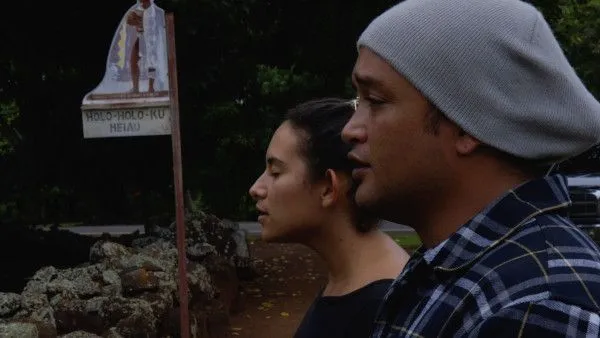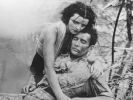Eye For Film >> Movies >> Cane Fire (2020) Film Review
Cane Fire
Reviewed by: Amber Wilkinson

While the detail of the history of Kaua'i is shown to be complicated by Anthony Banua-Simon's well-structured documentary about the Hawaiian island, it is also depressingly familiar - a story of the might of big business, colonialism, cultural appropriation and the disenfranchisement of the indigenous population that, as in so many places across the globe, has proved stubbornly resilient to change.
The Cane Fire of the title refers to the first of more than 100 films and TV shows to be shot on Kaua'i - from South Pacific to Fantasy Island. Made in 1934 by Lois Weber, the film - now lost - tackles a relationship between a colonialist and an indigenous young woman and builds to a rebellious conflagration. Banua-Simon uses film clips throughout this documentary, to illustrate the way people's perception of Hawaii has been shaped by them, showing along the way how the local populace are almost always relegated to "native" bit parts.

The director's own great-grandfather - a Filipino emigre who came to the island for work on one of the sugar plantations - was an extra in Cane Fire and Banua-Simon, who grew up in Seattle, uses this as a personal inroad into the story, connecting the wider socio-political history of the island with his family's experience down the decades. He shows how the island was mostly carved up by the big sugar cane companies and how, though the nature of their business has changed, their ownership and influence has continued to hold sway on Kaua'i.
To maintain their power, the firms have in the past, and continue, to use every trick in the bad-employer playbook, including importing a fresh set of migrants every time the previous lot of workers became organised in order to pit them against existing staff and suppress wages and rights, and creating such a low-wage economy that has led some employees working every hour God sends to also acquire addictions in a bid to get themselves through. Banua-Simon offers a strong critique of the situation, and particularly the housing crisis. But he also keeps in plenty of, often light-hearted, personal detail about his Uncle Henry, who acts as a guide of sorts to the island, along with his cousins, who are suffering from the current day problems of low wages and high living costs that have forced many to leave the island altogether. More darkly comic asides are provided by the inclusion of tourist videos and promotional reels, filled with rich white Americans who are dripping in toxic privilege they are unaware of.
The famous Coco Palms hotel - used in Fantasy Island among others - is shown to epitomise many of the island's wider problems. A haunt of the rich back when it was opened in the Fifties, it is situated on ancient land, considered sacred to many of the islanders. But rather than draw on the island's real history, we learn that its torch-light ceremony was created by the wife of the first owner Grace Guslander - just one of the many appropriations and manipulations of history that have happened down the years. Banua-Simon shows how, following a hurricane, the hotel fell to dereliction years ago and the how the land became more recently occupied by activists hoping to return it to a more natural state. Inevitably, perhaps, he also shows how they are now in conflict with owners who want to rebuild the hotel as another temple to profit, trying to woo the populace with the prospect of more low-paid employment. The director also ensures there are a range of voices heard in the documentary, including those who believe the restoration of Coco Palms is a good thing.
This subject matter could easily form the basis of a documentary series and Banua-Simon is, understandably, forced to only touch briefly on some issues, in particular those around addiction. But he does an admirable job of crystalising the main problems, using that "Hollywood film perception" as a touchstone. Just like the extras in the movies shot on the island, it seems the businessmen and realtors think the locals are there to be moved around to suit in order that the wealthy can stand in the spotlight - even if the incomers are only "resident" for a couple of months a year.
"What about us?" one of the director's cousins asks towards the end of his film. That remains the burning question as the fight for rights continues.
Reviewed on: 06 Jun 2020















